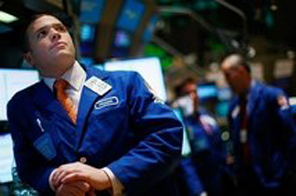Fed eyes modest pullback from stimulus
WASHINGTON: The Federal Reserve edged a step closer to acknowledging economic recovery as it announced a scaling back of a massive effort to pump liquidity into the financial system, analysts said.
Concluding a two-day monetary policy meeting on Wednesday, the Federal Open Market Committee (FOMC) maintained its near-zero base interest rate while saying that "economic activity is leveling out" amid the deep recession.
As widely expected, the panel headed by Fed chairman Ben Bernanke said it "continues to anticipate that economic conditions are likely to warrant exceptionally low levels of the federal funds rate for an extended period."
The central bank also said it would begin to pull away from a massive effort to pump liquidity into the financial system through the purchase of Treasury bonds and mortgage-backed securities.
The 300-billion-dollar Treasury bond program will be completed by the end of October, the Fed said, extending the effort by one month.
Analysts said the move was a first step toward moving away from extraordinary support of the economy through what some call "quantitative easing" -- essentially printing money to pump into the system.
"The Fed is pulling back on one market support program of buying Treasuries but it is easing out of it," said Robert Brusca at FAO Economics.
"The Fed is getting less worried but is not at a point to depend on recovery yet or to bet on how strong it will become."
Joel Naroff at Naroff Economic Advisors said the minor change in the Fed statement saying the economy was "leveling out," replacing a June phrase that "the pace of economic contraction is slowing," was significant.
The change "indicates to me the members believe the recession is basically over," Naroff said.
The pullback on Treasury purchases -- an extraordinary effort by the central bank aimed at keeping down interest rates it cannot directly control -- was also positive, said Naroff.
"The Fed wants to turn the operations of the markets back over to the markets and this is one sign that they are prepared to do so, though at a very cautious pace," he said.
The FOMC said it would "gradually slow the pace" of Treasury bond purchases and that it "anticipates that the full amount will be purchased by the end of October."
Craig Alexander, deputy chief economist at TD Bank Financial, said the announcement suggested only a small improvement in the troubled financial system.
The slowing of Treasury purchases "is a reflection that the economic numbers are showing some improvement," Alexander said.
"But they are not going so far as saying the economy doesn't require" the extra support.
Alexander said that under the current circumstances, the Fed may keep its near-zero rate policy for as long as another year.
"I don't think there is an urgency to tighten policy anytime soon," he said.
"I don't believe economic growth is going to be strong in the coming quarters. There is an awful lot of slack in the economy."
Ryan Sweet at Moody's Economy.com said the Fed's decision to slow its Treasury purchases was "a somewhat surprising twist," but stopped short of a major shift.
"The Fed appears in no hurry to tighten monetary policy as the sustainability of the recovery is still debatable," Sweet said.
The Fed announcement came days after news that gross domestic product (GDP) -- the broad measure of the economy's activity -- fell at an annualized rate of 1.0 percent in the second quarter, after a 6.4 percent plunge in the January-March period.
Unemployment dipped unexpectedly in July to 9.4 percent, one-tenth point lower than the 26-year high hit in June as job losses narrowed to 247,000.
Brian Bethune, economist at IHS Global Insight, said Fed policy remains highly stimulative.
"The Fed is sticking to its guns and maintaining a relatively aggressive posture on policy in a situation where the economy is at a critical turning point and inflation is running below the Fed's desired target," he said.
"There is no reason whatsoever to do anything that could potentially upset the apple cart as hopes for an incipient recovery after a long and painful recession are running high."






